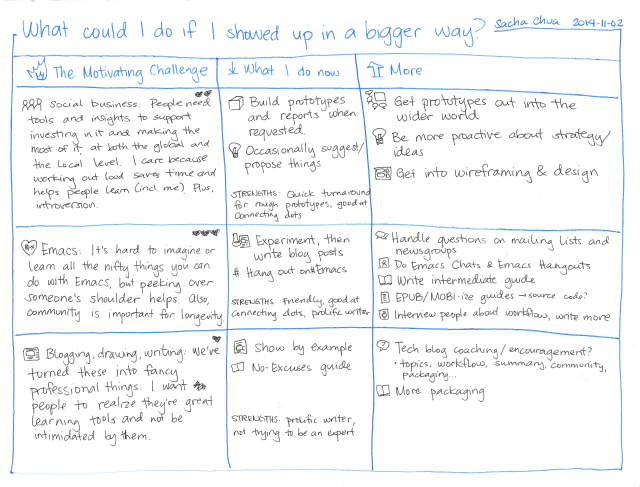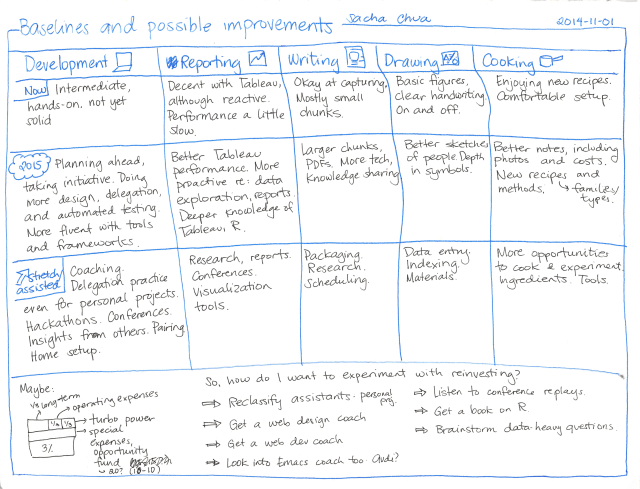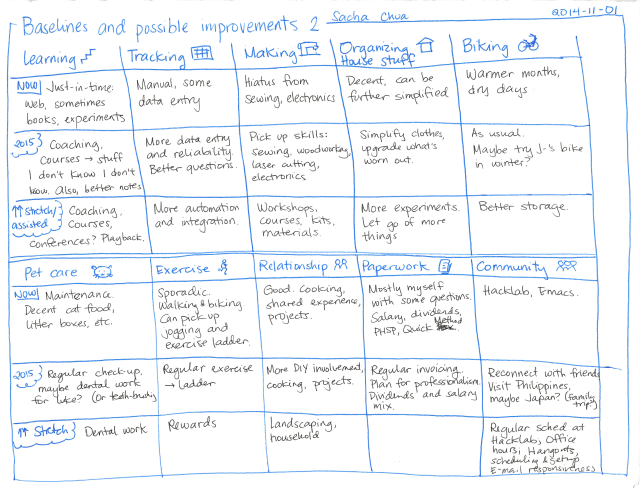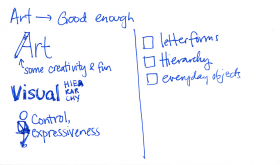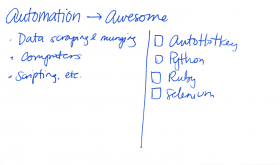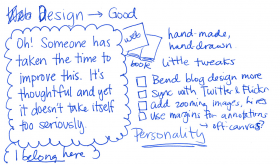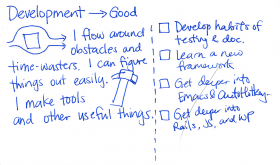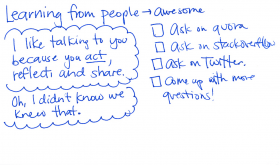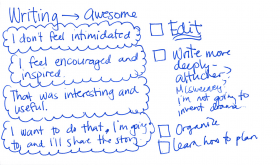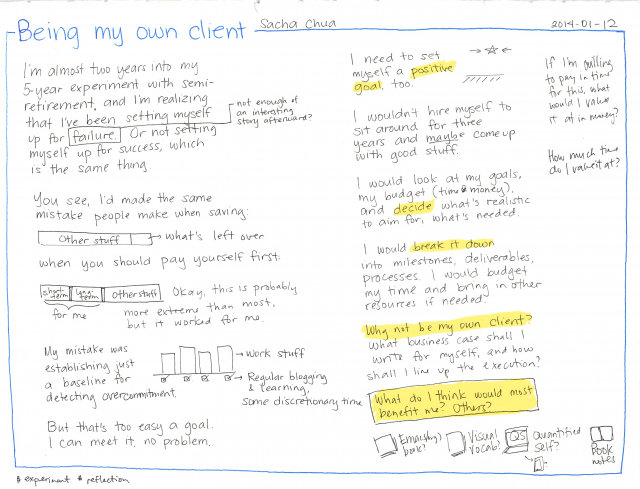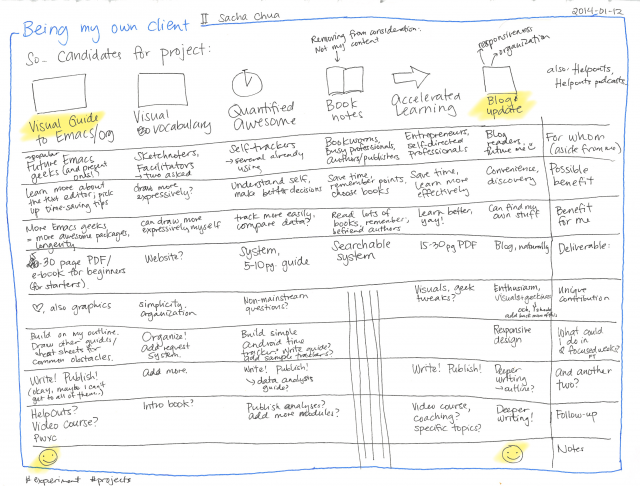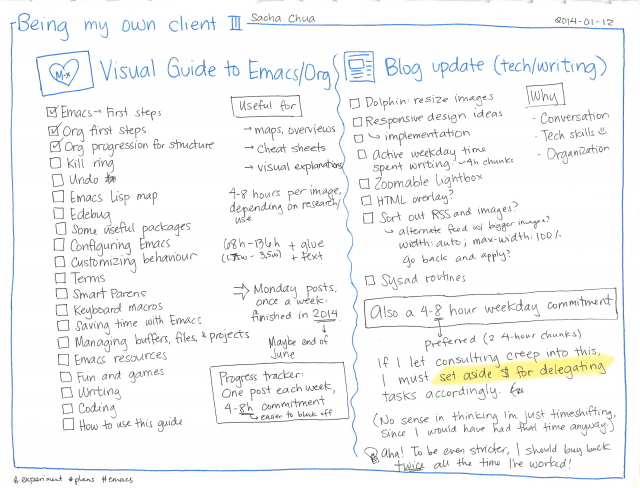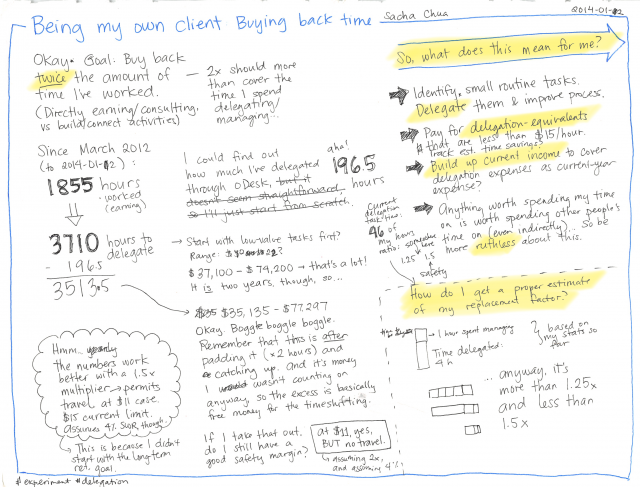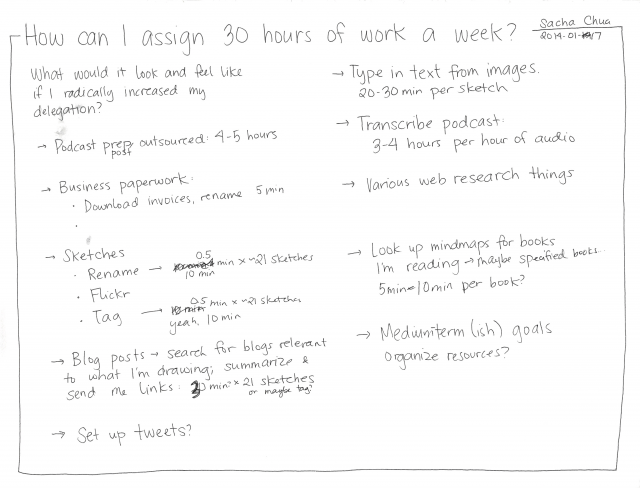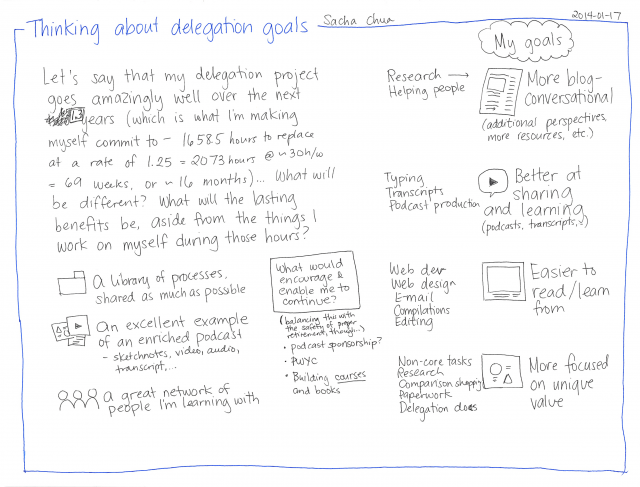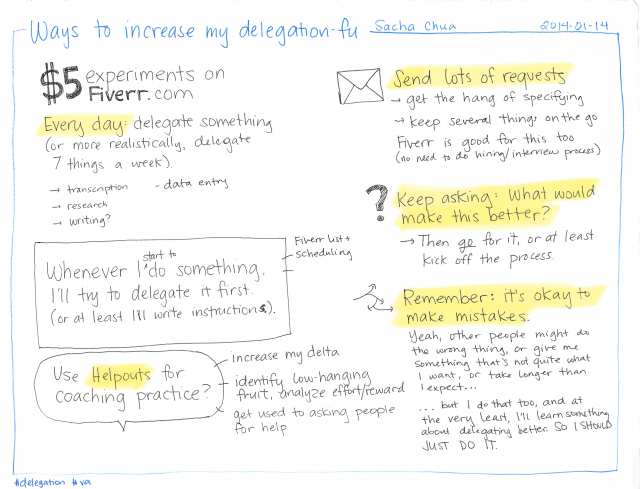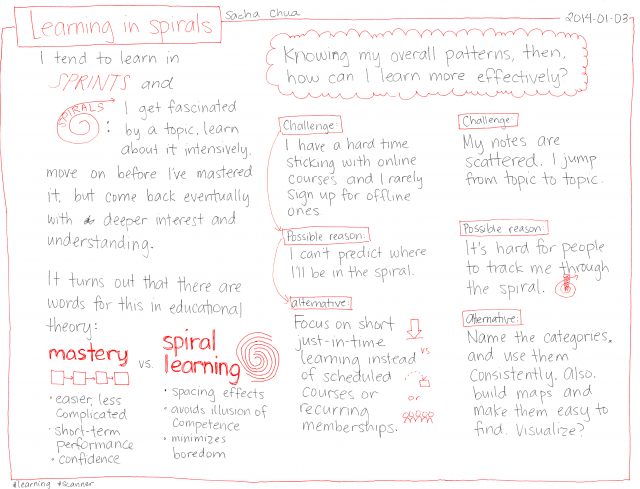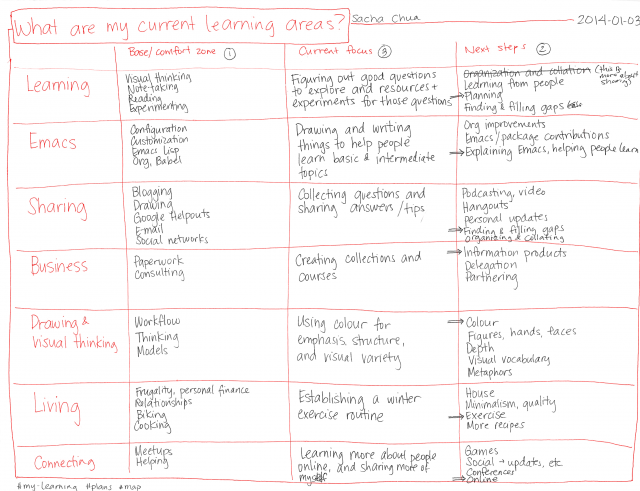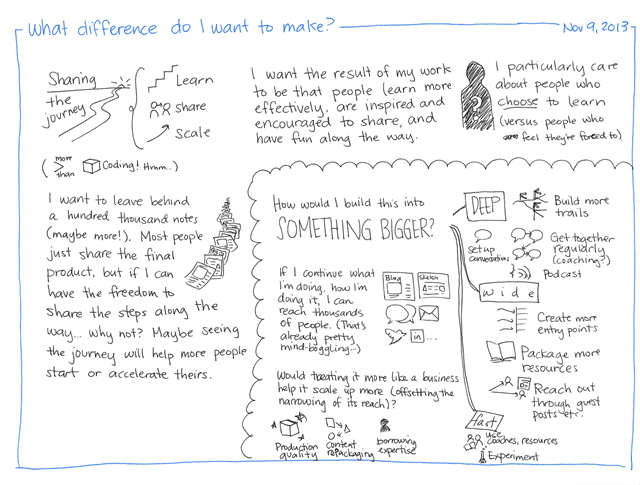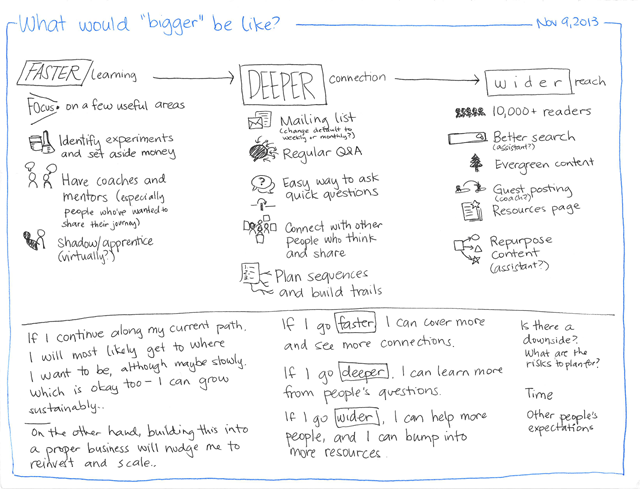Figuring out what to read by figuring out what you want to become or make or do
Posted: - Modified: | learning, plans, reading, writingIf you know what you want to do, you can figure out what you need to read to get there.
This tip might be obvious to other people, but I'm not used to planning my reading so that the books are aligned with an overall goal.
I make lots of learning plans, with various degrees of following through. Those plans tend to go out the window when I browse through the monthly new release lists on the library website or come across mentions from bibliographies and blog posts.
Books are my equivalent of impulse purchases at the supermarket checkout, the pull of slot machines, the intrigue of Kinder eggs. I think that's how I resist temptations like that. The library is where I let that impulse out to play.
We've checked out more than 400 books from the library this year. I've skimmed through most of them, although I've taken notes from a much smaller collection.
Since there's such a trove of free resources I can go through, I find it difficult to spend on books. Before last week, the last time I bought a book was November 2013. I suspect this is silly. The cost of a book is almost always less than the cost of taking the author out to lunch for discussion and brain-picking (and that's pretty much Not Going to Happen anyway). It's certainly less than the cost of figuring things out myself.
My reluctance often comes from an uncertainty about whether there'll be enough in the book, or whether it'll be the same concepts I've already read about, just given new clothes. I have to remember that I can get more out of a book than what the author put into it. A book isn't just a collection of insights. It's a list of questions to explore. It's a bibliography. It's a link in the conversation and a shorthand for concepts. It's an education on writing style and organization. It's sketchnoting practice and raw material for blog posts. It's fuel for connection.
Phrased that way, books are a bargain. Even not particularly good ones. Hmm. Maybe I should take the “Connection” part of my budget – the part that I'm supposed to be forcing myself to use for taking people out to coffee or lunch, the part that I never end up using all that much anyway – and experiment with using it for books.
I'm more comfortable when I use my money deliberately, so I also want to be deliberate about the books I buy. All books are bought – some with money, but all with time. This requires a plan, and this requires follow-through.
There are holes in the way I learn from books, the pipeline from acquisition to reading to notes to action to review. I want to become a better reader. My inner cheapskate says: practise on free books. But money can be a useful form of commitment too.
Anyway. A plan. It seems logical to decide on what I should proactively seek out and read by thinking about what I want to do. It also seems logical to require proof of my learning through writing blog posts and resources and maybe even books, the way students focus on final projects and consultants are measured by deliverables.
Here are some ideas for things I want to create out of what I want to learn:
- An approach for learning intermediate Emacs: After you've gotten the hang of the basics, how can you keep learning more about using and tweaking this text editor? This will probably take many forms: small weekly tips for constant improvement, Emacs Lisp and Org Mode courses, and so forth.
- What is the change I want to make in myself? After doing this, I want to be an even better user of Emacs. I want to work more efficiently and fluently, and I want to have more fun with it too.
- Who might find it useful? People who want to keep tweaking how they use Emacs. Mostly developers, but probably also writers and people interested in personal information management
- To do this, it would be good to read:
- Archives of Emacs blogs (ex: the ones featured on http://planet.emacsen.org/)
- Manuals for Emacs, Emacs Lisp, and popular packages
- the (small) collection of existing Emacs books
- Related technical books for taking people beyond the beginner stage
- Books about technical writing and learning design
- Source code
- A guide for creating your own personal knowledge management system: I doubt that a one-size-fits-all solution will work, at least not with our current understanding. But I want to learn more about different approaches, I want to make mine totally awesome, and I want to help people build their own from the pieces that are already out there.
- What is the change I want to make in myself? After doing this, I want to have a wonderfully organized system that lets me easily capture, review, make sense of, and share what I know. I also want to have the vocabulary and concepts to be able to critically examine this system, spot gaps or opportunities for improvement, and make things better.
- Who would find this useful? Fellow information packrats, writers, bloggers, self-directed learners
- To do this, it would be good to read about:
- Personal knowledge management and personal information management
- Guides to using various tools
- Information architecture
- Library science
- Writing and sense-making
- Tips for self-directed learning and experimentation: How to structure your time and learning, how to recognize and explore interesting questions, how to take notes, how to make sense of things, and so on. I want to learn more effectively, and I want to help other people learn more effectively too.
- What is the change I want to make in myself? After doing this, I want to be able to structure courses of study for myself, take great notes, build useful resources, and accumulate new knowledge.
- Who would find this useful? Self-directed learners who want something more than online courses
- To do this, it would be good to read about:
- Quantified Self, experimentation
- Note-taking and sense-making
- Self-directed learning
- More notes on working out loud: particularly addressing the excuses and barriers that get in people's way. To do this, it would be good to read about:
- What is the change I want to make in myself? After doing this, I want to have a smooth workflow for learning and sharing. I want to have a wide network of people who can build on the stuff I'm learning about, and who get manageable updates that are scoped to their interests.
- Who would find this useful? Individual practitioners interested in building their skills and network; social business advocates; bloggers who are also working on building personal insight and shared knowledge
- To do this, it would be good to read about:
- Social business, social learning, working out loud, personal learning networks, and personal knowledge management
- Collaboration, team communication
- Writing at work
- Visual thinking: particularly in terms of using it to clarify your thoughts, remember, and share. To do this, it would be good to read about:
- What is the change I want to make in myself? After doing this, I want to be more fluent in using visual tools to explore thoughts and figure things out. I want to improve in terms of visual organization, technique, clarity, explanation, integration into my self-directed workflow, and so on.
- Who would find this useful? People who've already started doodling (or who are picking up the hang of it) and who would like to use it for more things
- To do this, it would be good to read about:
- Mind mapping and other forms of visual organization
- Sketchnoting
- Planning
- Blogging and other forms of personal publishing
- Journaling
- Information organization and sense-making
- Something about how to follow the butterflies of your interest, because I rarely see this perspective in productivity books and because it's something other people might find helpful.
- What is the change I want to make in myself? I want to get better at going with the grain of my energy, doing what I want to do (and doing the work that helps me want what is good to want).
- Who would find this useful? People with many interests – scanners, multi-potentialites, Renaissance-people-to-be.
- To do this, it would be good to read about:
- Career and life planning, especially unconventional paths
- Productivity
- Writing, note-taking
- Psychology, cognitive limits, distraction
Hmm. I've done literature reviews before, collecting quotes and references and connecting things to each other. I can do that again. It doesn't mean giving up my impulse reads, my openness to serendipity and surprise. It simply means choosing something I want to learn more about and then taking it all in, with more awareness and less evaluation, so that I can get a sense of the whole. This will help me find the things that have already been written so that I don't have to write them again. This will help me collect different approaches and ideas so that I can springboard off them.
I like books with references more than I like books without them. Books with few references feel like they float unanchored. I recognize ideas but feel weird about the lack of attribution. There are no links where I can explore a concept in depth. On the other hand, too many references and quotes make a book feel like a pastiche with little added, a collection of quotes glued together with bubblegum and string. A good balance makes a book feel like it builds on what has gone before while adding something new. I want to write books and resources like that, and if I'm going to do so, I need notes so that I can trace ideas back to where people can learn more about them, and so I can make sense of that conversation as a whole. Deliberate study helps with that.
What topics will you read about in 2015, and why? What are the changes you want to make in yourself, what are the resources you can build for others, and what books can you build on to get there?
Possibly related:
- A long reflection on getting more out of each hour, on how taking the right perspective can help me get multiple times the value of each hour.
- Becoming a better reader

